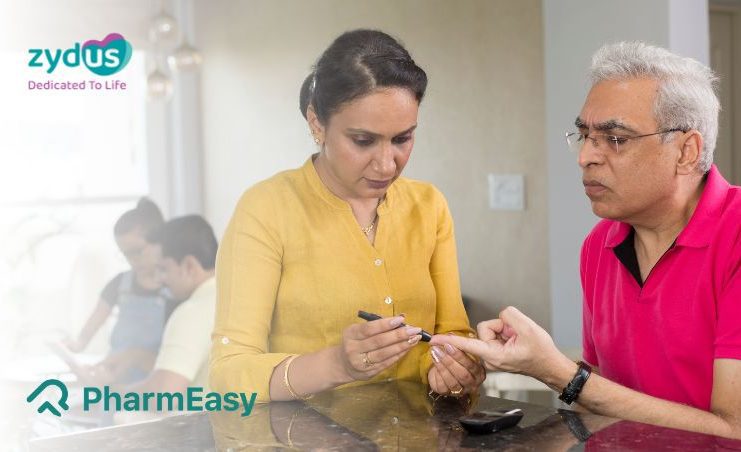Diabetes Caregiver’s Perspective: How To Take Care Of A Diabetic Patient?
By Dr. Nikita Toshi +2 more

Get,

to manage your symptom
Get your,


4 Cr+ families
benefitted

OTP sent to 9988776655



You’ve successfully subscribed to receive
doctor-approved tips on
Whatsapp

Get ready to feel your best.

Hi There,
Download the PharmEasy App now!!


Register to Avail the Offer
Send OTPBy continuing, you agree with our Privacy Policy and Terms and Conditions

Hi There,
Sign up on PharmEasy now!!
Trusted by 4 crore+ families

OTP sent to 9988776655



You have unlocked 25% off on medicines




Code: NU25
By Dr. Nikita Toshi +2 more
Table of Contents
A study of more than 5000 adults with Diabetes highlighted the importance of family, friends, and colleagues in improving well-being and self-management. Family members are often asked to share the responsibility for disease management. They can provide many forms of support, such as instrumental support in driving patients to appointments or helping to inject insulin and social and emotional support in helping patients cope with their disease.
Through their communication and attitudes, family members often have a significant impact on a patient’s psychological well-being, the decision to follow recommendations for medical treatment, and the ability to initiate and maintain changes in diet and exercise.

Family members can feel distressed by their loved one’s diabetes due to limited knowledge about diabetes or not knowing how to support their loved one.
The family may also have misconceptions, such as believing that the patient knows more about diabetes than the patient actually reports or not understanding their loved one’s needs in diabetes management.
Knowledge about the disease, strategies to alter family routines, and optimal ways to cope with the emotional aspects of the disease are some of the aspects of diabetes self-management that family members need.
Stress can affect their blood sugar. Some daily activities that might help them ease stress: walking, deep breathing exercises, gardening, meditation, listening to music might be part of a diabetic patient’s routine.
Dr. Ashish Bajaj , MBBS, MD in Clinical Pharmacology and Toxicology
Educating family members about diabetes-care needs can help ease this strain by explaining why these changes are necessary, how these changes can best be implemented, and where to find additional information, such as healthy recipes or exercise routines.
Ensuring that the person with diabetes gets regular medical care (which may include making appointments as well as providing transportation) Providing healthy meals. Planning the timing of meals, to avoid issues like hypoglycemia (low blood sugar) Encouraging healthy habits, like getting enough exercise and sleep.
Dr. M.G. Kartheeka, MBBS, MD(Pediatrics)
The following 4 cornerstones of care are really important to pay attention to when taking care of a family member with Diabetes:
If you have a child with diabetes, gradually teach him or her how to manage the condition: Although parents should always have a role in monitoring their child’s diabetes, as they get older, teens can take an increasing role in blood sugar monitoring and meal planning.
Need more information on diabetes and its related diseases? Ask Anya! Chat with Anya Bot here via Facebook and get more information on diabetes management.
Disclaimer: The information provided here is for educational/awareness purposes only and is not intended to be a substitute for medical treatment by a healthcare professional and should not be relied upon to diagnose or treat any medical condition. The reader should consult a registered medical practitioner to determine the appropriateness of the information before consuming any medication. PharmEasy does not provide any guarantee or warranty (express or implied) regarding the accuracy, adequacy, completeness, legality, reliability, or usefulness of the information; and disclaims any liability arising thereof.
Links and product recommendations in the information provided here are advertisements of third-party products available on the website. PharmEasy does not make any representation of the accuracy or suitability of such products/services. Advertisements do not influence the editorial decisions or content. The information in this blog is subject to change without notice. The authors and administrators reserve the right to modify, add, or remove content without notification. It is your responsibility to review this disclaimer regularly for any changes.

Leave your comment...
Comments